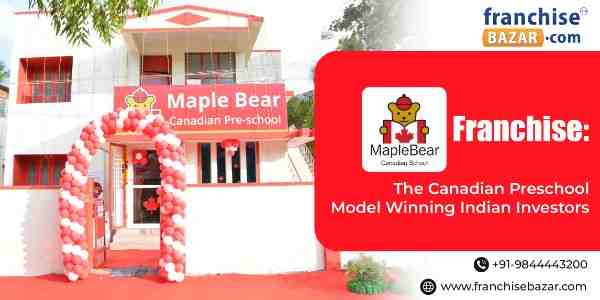Maple Bear Franchise: The Canadian Preschool Model Winning Indian Investors

Written By: Harsh Vardhan Singh
India’s early education sector has exploded over the last decade, but among the crowd of preschool brands, one name stands out for its global roots and international learning standards: Maple Bear, a Canadian preschool chain that has quietly built one of the strongest reputations in the premium early-education space. Operating across 550+ schools in 30+ countries, Maple Bear brings the best of Canadian bilingual education franchise to Indian classrooms. With a rapidly growing presence in urban and semi-urban India, the brand is now one of the most sought-after preschool franchise opportunities for investors looking for high credibility, premium fees, and strong return potential.
If you're considering entering the early education business, this detailed guide breaks down the cost, curriculum, franchise model, ROI, location strategy, and why 2026 will be a landmark year for the Maple Bear franchise in India.
Brand Overview: The Canadian Approach Making Global Waves
Maple Bear began with a simple mission to bring high-quality, research-backed education systems to children around the world. Rooted in Canada’s globally respected education framework, Maple Bear blends immersion-based bilingual learning, child-centric teaching, and experiential development models.
What stands out most is the brand’s focus on:
- English immersion teaching methodology
- Play-based learning designed by Canadian academic experts
- Balanced literacy program
- Continuous teacher training from Canadian faculty
- Global uniformity in academic standards
From Delhi to Dubai to São Paulo, Maple Bear maintains the same commitment to academic excellence and that’s a major part of its India success.
Why Investors Are Choosing Maple Bear in 2026
The Indian preschool landscape is already competitive, yet Maple Bear continues to attract serious investors. Why?
Because the brand is positioned at the premium end of the market, a space that continues to grow as urban parents demand global exposure and safety standards for their toddlers.
Key reasons investors prefer Maple Bear include:
- Premium fee structure with strong margins
- High trust factor due to Canadian curriculum
- Growing demand for international early education
- Strong urban appeal among millennial parents
- Proven track record in 125+ Indian cities
- Safety, hygiene, and compliance systems that parents love
2026 presents a uniquely strong opportunity due to rising dual-income households, NEP 2020 focus on foundational learning, and parent preference for structured, global-standard preschools.
Business Model - The FOFO Structure
Maple Bear India operates on a FOFO (Franchise-Owned, Franchise-Operated) model.
This means:
- You own the property, infrastructure, and operations.
- Maple Bear provides curriculum, teacher training, branding, SOPs, and academic supervision.
- All centers follow the same standardized academic system to maintain global consistency.
- This model ensures high autonomy for franchise owners while still benefiting from Maple Bear’s global brand value.
Investment & Setup Cost for Maple Bear Franchise in India 2026
Being a premium preschool, Maple Bear’s investment is higher than basic standalone preschools but significantly more justified due to consistent demand and international positioning.
Estimated Investment Breakdown:
- Franchise Fee: ₹8–12 lakh
- Interiors & Infrastructure: ₹12–18 lakh
- Furniture, Learning Aids & Play Equipment: ₹5–7 lakh
- Technology Setup & Academic Materials: ₹3–4 lakh
- Space Required: 2,000–3,000 sq. ft. (owned or leased)
- Royalty: 20–25% of tuition revenue (varies by city)
- Total Estimated Investment: ₹25–35 lakh (location dependent).
This makes it ideal for investors who want to run an international-grade school without the ₹75-90 lakh investment required for large premium brands.
Profit Margin & ROI: Why Maple Bear Works
The premium preschool segment has one of the best margin structures in the Indian education sector.
Expected Profitability Snapshot (2026)
- Annual Fee Per Child: ₹70,000–₹1,20,000 (city dependent)
- Center Capacity: 120–180 students
- Gross Annual Revenue: ₹80 lakh – ₹2 crore
- Net Profit Margin: 35–45%
- Break-even Timeline: 12–18 months
- ROI: Strong long-term value due to brand recall and premium demand
Unlike coaching centers or seasonal education businesses, preschools have year-round revenue stability and extremely high parent retention rates.
Academic Framework - What Makes Maple Bear Special?
Maple Bear’s curriculum is developed by Canadian early-learning experts and continuously updated with global best practices.
- Core Academic Elements:
- Bilingual immersion approach
- Focus on literacy, numeracy & cognitive development
- Inquiry-based science activities
- Holistic emotional & social development
- Hands-on sensory learning
- Music, movement & storytelling pedagogy
This approach builds foundational learning skills early, making Maple Bear centers extremely popular among parents who prioritize international learning exposure.
Teacher Training & Quality Assurance
One of Maple Bear’s biggest strengths is its strong teacher training ecosystem, which ensures consistent quality across all centers.
Franchisees receive:
- Initial training for all staff
- Regular workshops by Canadian trainers
- Classroom observation sessions
- Academic audits
- Safety and hygiene compliance training
- Curriculum update seminars
This continuous upskilling is a huge differentiator parents value schools where teachers evolve consistently with global standards.
Ideal Location & Infrastructure Requirements
Maple Bear centers should ideally be located in residential or mixed-use neighborhoods with high density of young families.
Ideal Property Features:
- Ground-floor property
- 2,000–3,000 sq. ft. built-up space
- Safe access roads
- Ventilated classrooms
- Outdoor play area (500–700 sq. ft.)
- CCTV, fire safety, child-safe interiors
Best Cities for Maple Bear Expansion in 2026:
- Tier-1: Bengaluru, Delhi NCR, Mumbai, Pune, Chennai, Hyderabad
- Tier-2: Jaipur, Lucknow, Indore, Chandigarh, Coimbatore, Surat
- Tier-3: Mysuru, Kochi, Raipur, Patna, Udaipur, Bhubaneswar
The brand’s focus is shifting toward semi-premium neighborhoods, where demand is rising and competition from local preschools is weak.
Marketing, Events & Community Building
Maple Bear uses a mix of digital and offline campaigns to drive admissions.
Marketing support includes:
- Centralized digital marketing
- SEO-driven parent acquisition funnels
- Creative assets for social media
- Seasonal admission campaigns
- Event calendars: sports day, storytelling fests, science carnivals
- Parent-engagement workshops
- Local launch events
Preschools succeed due to trust and Maple Bear ensures franchisees build strong community presence.
Technology Integration & Digital Learning
Even at the preschool level, Maple Bear integrates balanced tech-based learning tools, such as:
Smart-class tools
- Digital parent-teacher portals
- Real-time student activity updates
- Learning Management System (LMS)
- AI-assisted learning suggestions (in pilot cities)
This hybrid approach bridges traditional learning with modern needs, an essential expectation among millennial parents.
Comparison With Other Preschool Franchises
Here’s how Maple Bear stands in the Indian market:
- Kidzee: Affordable, mass-market; Maple Bear offers a more premium model.
- EuroKids: Strong competition; Maple Bear appeals to international-learning seekers.
- Kangaroo Kids: Highly premium; Maple Bear offers similar quality at lower cost.
- Little Millennium: Strong Tier-2 presence; Maple Bear focuses on global pedagogy.
Maple Bear stands out for its Canadian brand value and international learning system.
Risks & Considerations Before Investing
No franchise is risk-free investors must consider:
- Initial struggle to build parent trust in smaller cities
- Higher fee pricing compared to local schools
- Staff retention challenges
- Need for consistent quality audits
- Residential zoning approvals in some cities
That said, Maple Bear’s training and support significantly lowers operational challenges.
Why 2026 Is the Best Year to Invest
2026 is a turning point for India’s preschool sector. Major shifts include:
- NEP 2020 emphasizing early learning
- 2x growth in nuclear families
- Parents choosing structured preschools over informal playschools
- Demand for international learning exposure
- Rising per-child spending across Tier-2 & Tier-3 India
Maple Bear sits at the intersection of these trends offering credibility, global standards, and long-term growth.
The Power of the Maple Bear Brand
What truly sets Maple Bear apart is its identity as a global preschool chain that blends Canadian quality with the warmth of Indian schooling culture.
Parents perceive Maple Bear as:
- Safe
- Premium
- International
- Structured
- Emotionally nurturing
That perception alone drives admissions and builds strong franchise profitability.
The Emotional & Long-Term Value of a Maple Bear Franchise
Beyond the financial returns, a Maple Bear franchise offers something many investors deeply appreciate: a legacy-driven business built on trust, reputation, and educational impact. Unlike retail or food franchises that struggle with seasonality or changing trends, the early education sector remains remarkably stable. Every year brings a new batch of admissions, and every center becomes a cornerstone in its community. Parents talk, recommend, and build multi-year relationships with preschools they trust.
Maple Bear benefits tremendously from this cycle. Its Canadian academic system, strict safety protocols, and polished international positioning create strong parent loyalty, which naturally translates into long-term revenue stability for franchise owners. Many centers expand faster simply because parents request extended programs, daycare add-ons, or additional branches within the same locality.
Moreover, investors often describe Maple Bear as a “feel-good business” one where daily operations revolve around children’s joy, creativity, and growth. This emotional satisfaction adds a unique dimension to the franchise, making it far more fulfilling than purely transactional businesses.
In an era where families increasingly prioritize structured learning and global exposure, Maple Bear stands at the perfect intersection of heartfelt purpose and predictable profitability.
Final Takeaway - A Preschool Franchise with Global Heart & Local Opportunity
The Maple Bear franchise in India 2026 gives investors a rare combination: international curriculum, high trust value, scalable admissions, and a consistently growing market.
It’s not just a place for children to learn, it's a place where global education meets Indian aspirations.
If you’re looking for a franchise that blends purpose and profit, Maple Bear is one of the smartest education investments you can make today.
When you invest in a child’s first steps, you’re investing in a lifetime of possibilities.
Disclaimer: The brands mentioned in this blog are the recommendations provided by the author. FranchiseBAZAR does not claim to work with these brands / represent them / or are associated with them in any manner. Investors and prospective franchisees are to do their own due diligence before investing in any franchise business at their own risk and discretion. FranchiseBAZAR or its Directors disclaim any liability or risks arising out of any transactions that may take place due to the information provided in this blog.For more such opportunities, visit us on our Insta and FB
Recent Blogs

Written By: Yukta Palekar
In today’s...

Written By: Khushboo Verma
Buying into a business...

Written By: Harsh Vardhan Singh
The Indian beauty...

Written By: Gouri Ghosh
When people...
Why Should I Register?
You are seeking to access information which is provided only to registered members. It takes less than a minute to register and access information on FRANCHISEBAZAR.